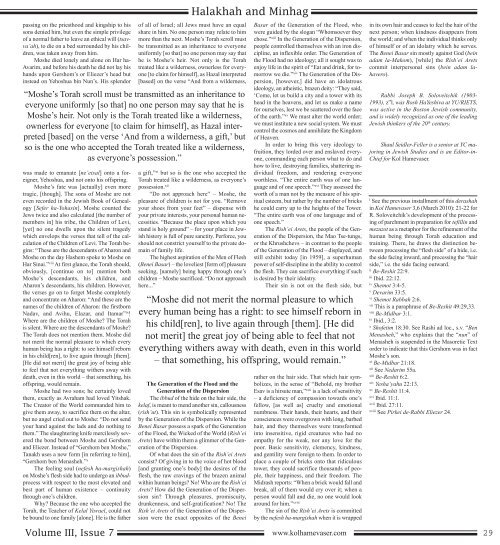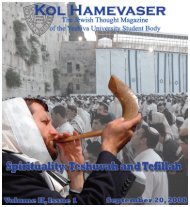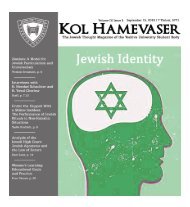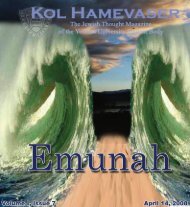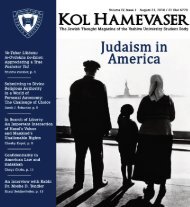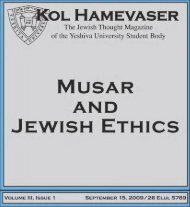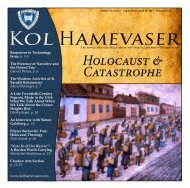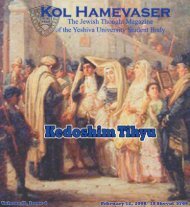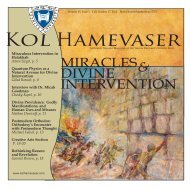You also want an ePaper? Increase the reach of your titles
YUMPU automatically turns print PDFs into web optimized ePapers that Google loves.
passing on the priesthood <strong>and</strong> kingship to his<br />
sons denied him, but even the simple privilege<br />
of a normal father to leave an ethical will (tsavva’ah),<br />
to die on a bed surrounded by his children,<br />
was taken away from him.<br />
Moshe died lonely <strong>and</strong> alone on Har ha-<br />
Avarim, <strong>and</strong> before his death he did not lay his<br />
h<strong>and</strong>s upon Gershom’s or Eliezer’s head but<br />
instead on Yehoshua bin Nun’s. His splendor<br />
was made to emanate [ne’etsal] onto a foreigner,<br />
Yehoshua, <strong>and</strong> not onto his offspring.<br />
Moshe’s fate was [actually] even more<br />
tragic, [though]. The sons of Moshe are not<br />
even recorded in the Jewish Book of Genealogy<br />
[Sefer ha-Yohasin]. Moshe counted the<br />
Jews twice <strong>and</strong> also calculated [the number of<br />
members in] his tribe, the Children of Levi,<br />
[yet] no one dwells upon the silent tragedy<br />
which envelops the verses that tell of the calculation<br />
of the Children of Levi. The Torah begins:<br />
“These are the descendants of Aharon <strong>and</strong><br />
Moshe on the day Hashem spoke to Moshe on<br />
Har Sinai.” viii At first glance, the Torah should,<br />
obviously, [continue on to] mention both<br />
Moshe’s descendants, his children, <strong>and</strong><br />
Aharon’s descendants, his children. However,<br />
the verses go on to forget Moshe completely<br />
<strong>and</strong> concentrate on Aharon: “And these are the<br />
names of the children of Aharon: the firstborn<br />
Nadav, <strong>and</strong> Avihu, Elazar, <strong>and</strong> Itamar” ix !<br />
Where are the children of Moshe? The Torah<br />
is silent. Where are the descendants of Moshe?<br />
The Torah does not mention them. Moshe did<br />
not merit the normal pleasure to which every<br />
human being has a right: to see himself reborn<br />
in his child[ren], to live again through [them].<br />
[He did not merit] the great joy of being able<br />
to feel that not everything withers away with<br />
death, even in this world – that something, his<br />
offspring, would remain.<br />
Moshe had two sons; he certainly loved<br />
them, exactly as Avraham had loved Yitshak.<br />
The Creator of the World comm<strong>and</strong>ed him to<br />
give them away, to sacrifice them on the altar,<br />
but no angel cried out to Moshe: “Do not send<br />
your h<strong>and</strong> against the lads <strong>and</strong> do nothing to<br />
them.” The slaughtering knife mercilessly severed<br />
the bond between Moshe <strong>and</strong> Gershom<br />
<strong>and</strong> Eliezer. Instead of “Gershom ben Moshe,”<br />
Tanakh uses a new form [in referring to him],<br />
“Gershom ben Menasheh.” x<br />
The feeling soul (nefesh ha-margishah)<br />
on Moshe’s flesh side had to undergo an ibbudprocess<br />
with respect to the most elevated <strong>and</strong><br />
best part of human existence – continuity<br />
through one’s children.<br />
Why? Because the one who accepted the<br />
Torah, the Teacher of Kelal Yisrael, could not<br />
be bound to one family [alone]. He is the father<br />
<strong>Halakhah</strong> <strong>and</strong> <strong>Minhag</strong><br />
of all of Israel; all Jews must have an equal<br />
share in him. No one person may relate to him<br />
more than the next. Moshe’s Torah scroll must<br />
be transmitted as an inheritance to everyone<br />
uniformly [so that] no one person may say that<br />
he is Moshe’s heir. Not only is the Torah<br />
treated like a wilderness, ownerless for everyone<br />
[to claim for himself], as Hazal interpreted<br />
[based] on the verse “And from a wilderness,<br />
“Moshe’s Torah scroll must be transmitted as an inheritance to<br />
everyone uniformly [so that] no one person may say that he is<br />
Moshe’s heir. Not only is the Torah treated like a wilderness,<br />
ownerless for everyone [to claim for himself], as Hazal interpreted<br />
[based] on the verse ‘And from a wilderness, a gift,’ but<br />
so is the one who accepted the Torah treated like a wilderness,<br />
as everyone’s possession.”<br />
a gift,” xi but so is the one who accepted the<br />
Torah treated like a wilderness, as everyone’s<br />
possession. xii<br />
“Do not approach here” – Moshe, the<br />
pleasure of children is not for you. “Remove<br />
your shoes from your feet” – dispense with<br />
your private interests, your personal human necessities.<br />
“Because the place upon which you<br />
st<strong>and</strong> is holy ground” – for your place in Jewish<br />
history is full of pure sanctity. Perforce, you<br />
should not constrict yourself to the private domain<br />
of family life.<br />
The highest aspiration of the Men of Flesh<br />
(Benei Basar) – the loveliest [form of] pleasure<br />
seeking, [namely] being happy through one’s<br />
children – Moshe sacrificed. “Do not approach<br />
here...”<br />
The Generation of the Flood <strong>and</strong> the<br />
Generation of the Dispersion<br />
The ibbud of the hide on the hair side, the<br />
kelaf, is meant to mend another sin, callousness<br />
(rish’ut). This sin is symbolically represented<br />
by the Generation of the Dispersion. While the<br />
Benei Basar possess a spark of the Generation<br />
of the Flood, the Wicked of the World (Rish’ei<br />
Arets) have within them a glimmer of the Generation<br />
of the Dispersion.<br />
Of what does the sin of the Rish’ei Arets<br />
consist? Of giving in to the voice of hot blood<br />
[<strong>and</strong> granting one’s body] the desires of the<br />
flesh, the raw cravings of the brazen animal<br />
within human beings? No! Who are the Rish’ei<br />
Arets? How did the Generation of the Dispersion<br />
sin? Through pleasures, promiscuity,<br />
drunkenness, <strong>and</strong> self-gratification? No! The<br />
Rish’ei Arets of the Generation of the Dispersion<br />
were the exact opposites of the Benei<br />
Basar of the Generation of the Flood, who<br />
were guided by the slogan “Whomsoever they<br />
chose.” xiii In the Generation of the Dispersion,<br />
people controlled themselves with an iron discipline,<br />
an inflexible order. The Generation of<br />
the Flood had no ideology; all it sought was to<br />
enjoy life in the spirit of “Eat <strong>and</strong> drink, for tomorrow<br />
we die.” xiv The Generation of the Dispersion,<br />
[however,] did have an idolatrous<br />
ideology, an atheistic, brazen deity: “They said,<br />
‘Come, let us build a city <strong>and</strong> a tower with its<br />
head in the heavens, <strong>and</strong> let us make a name<br />
for ourselves, lest we be scattered over the face<br />
of the earth.” xv We must alter the world order;<br />
we must institute a new social system. We must<br />
control the cosmos <strong>and</strong> annihilate the Kingdom<br />
of Heaven.<br />
In order to bring this very ideology to<br />
fruition, they lorded over <strong>and</strong> enslaved everyone,<br />
comm<strong>and</strong>ing each person what to do <strong>and</strong><br />
how to live, destroying families, shattering individual<br />
freedom, <strong>and</strong> rendering everyone<br />
worthless. “The entire earth was of one language<br />
<strong>and</strong> of one speech.” xvi They assessed the<br />
worth of a man not by the measure of his spiritual<br />
esteem, but rather by the number of bricks<br />
he could carry up to the heights of the Tower.<br />
“The entire earth was of one language <strong>and</strong> of<br />
one speech.”<br />
The Rish’ei Arets, the people of the Generation<br />
of the Dispersion, the Mao Tse-tungs,<br />
or the Khrushchevs – in contrast to the people<br />
of the Generation of the Flood – displayed, <strong>and</strong><br />
still exhibit today [in 1959], a superhuman<br />
power of self-discipline in the ability to control<br />
the flesh. They can sacrifice everything if such<br />
is desired by their idolatry.<br />
Their sin is not on the flesh side, but<br />
“Moshe did not merit the normal pleasure to which<br />
every human being has a right: to see himself reborn in<br />
his child[ren], to live again through [them]. [He did<br />
not merit] the great joy of being able to feel that not<br />
everything withers away with death, even in this world<br />
– that something, his offspring, would remain.”<br />
rather on the hair side. That which hair symbolizes,<br />
in the sense of “Behold, my brother<br />
Esav is a hirsute man,” xvii is a lack of sensitivity<br />
– a deficiency of compassion towards one’s<br />
fellow, [as well as] cruelty <strong>and</strong> emotional<br />
numbness. Their h<strong>and</strong>s, their hearts, <strong>and</strong> their<br />
consciences were overgrown with long, barbed<br />
hair, <strong>and</strong> they themselves were transformed<br />
into insensitive, rigid creatures who had no<br />
empathy for the weak, nor any love for the<br />
poor. Basic sensitivity, clemency, kindness,<br />
<strong>and</strong> gentility were foreign to them. In order to<br />
place a couple of bricks onto that ridiculous<br />
tower, they could sacrifice thous<strong>and</strong>s of people,<br />
their happiness, <strong>and</strong> their freedom. The<br />
Midrash reports: “When a brick would fall <strong>and</strong><br />
break, all of them would cry over it; when a<br />
person would fall <strong>and</strong> die, no one would look<br />
around for him.” xviii<br />
The sin of the Rish’ei Arets is committed<br />
by the nefesh ha-margishah when it is wrapped<br />
Volume III, Issue 7 www.kolhamevaser.com<br />
in its own hair <strong>and</strong> ceases to feel the hair of the<br />
next person; when kindness disappears from<br />
the world; <strong>and</strong> when the individual thinks only<br />
of himself or of an idolatry which he serves.<br />
The Benei Basar sin mostly against God (bein<br />
adam la-Makom), [while] the Rish’ei Arets<br />
commit interpersonal sins (bein adam lahavero).<br />
Rabbi Joseph B. Soloveitchik (1903-<br />
1993), z”l, was Rosh HaYeshiva at YU/RIETS,<br />
was active in the Boston Jewish community,<br />
<strong>and</strong> is widely recognized as one of the leading<br />
Jewish thinkers of the 20 th century.<br />
Shaul Seidler-Feller is a senior at YC majoring<br />
in Jewish Studies <strong>and</strong> is an Editor-in-<br />
Chief for <strong>Kol</strong> <strong>Hamevaser</strong>.<br />
i See the previous installment of this derashah<br />
in <strong>Kol</strong> <strong>Hamevaser</strong> 3,6 (March 2010): 21-22 for<br />
R. Soloveitchik’s development of the processing<br />
of parchment in preparation for tefillin <strong>and</strong><br />
mezuzot as a metaphor for the refinement of the<br />
human being through Torah education <strong>and</strong><br />
training. There, he draws the distinction between<br />
processing the “flesh side” of a hide, i.e.<br />
the side facing inward, <strong>and</strong> processing the “hair<br />
side,” i.e. the side facing outward.<br />
ii Be-Reshit 22:9.<br />
iii Ibid. 22:12.<br />
iv Shemot 3:4-5.<br />
v Devarim 33:5.<br />
vi Shemot Rabbah 2:6.<br />
vii This is a paraphrase of Be-Reshit 49:29,33.<br />
viii Be-Midbar 3:1.<br />
ix Ibid., 3:2.<br />
x Shofetim 18:30. See Rashi ad loc., s.v. “Ben<br />
Menasheh,” who explains that the “nun” of<br />
Menasheh is suspended in the Masoretic Text<br />
order to indicate that this Gershom was in fact<br />
Moshe’s son.<br />
xi Be-Midbar 21:18.<br />
xii See Nedarim 55a.<br />
xiii Be-Reshit 6:2.<br />
xiv Yesha’yahu 22:13.<br />
xv Be-Reshit 11:4.<br />
xvi Ibid. 11:1.<br />
xvii Ibid. 27:11.<br />
xviii See Pirkei de-Rabbi Eliezer 24.<br />
29


